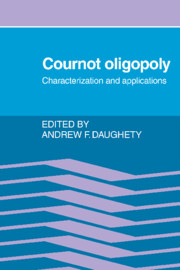Book contents
- Frontmatter
- Contents
- Preface
- Part I Introduction
- Part II Background
- 1 Of the competition of producers
- 2 Review of Walras's Théorie mathématique de la richesse sociale and Cournot's Recherches sur les principes mathématiques de la théorie des richesses
- 3 Non-cooperative games
- Part III Examining Cournot's model
- Part IV Applications
2 - Review of Walras's Théorie mathématique de la richesse sociale and Cournot's Recherches sur les principes mathématiques de la théorie des richesses
Published online by Cambridge University Press: 07 September 2009
- Frontmatter
- Contents
- Preface
- Part I Introduction
- Part II Background
- 1 Of the competition of producers
- 2 Review of Walras's Théorie mathématique de la richesse sociale and Cournot's Recherches sur les principes mathématiques de la théorie des richesses
- 3 Non-cooperative games
- Part III Examining Cournot's model
- Part IV Applications
Summary
Théorie mathématique de la richesse sociale, by Léon Walras, professor of political economy at the academy of Lausanne, Lausanne, 1883.
Recherches sur lesprincipes mathématiques de la théorie des richesses, by Augustin Cournot, Paris, 1838.
The title of these books seems to promise a new and secure path for the science of Adam Smith; however, the authors have received a very indifferent reception. A distinguished scholar, a skillful writer, endowed with an original and lofty intellect, Cournot was a master in the art of deduction. Mr. Walras does himself credit by being his disciple. “Mr. Cournot”, he says, “is the first person to have seriously attempted the application of mathematics to political economy; he did so in a work published in 1838 which no French author has ever criticized. I have insisted,” adds the learned professor of Lausanne, “upon mentioning the author of a remarkable endeavor upon which, I repeat, no judgment has been brought and to which I dare say justice has not been rendered.”
This reproach, publicly addressed to Cournot's fellow countrymen, gave me a reason for re-reading a thoroughly forgotten work which, in spite of the well deserved reputation of the author, has not left a favorable impression upon all of those who have read it. “The title of my work,” says Cournot in his preface, “not only announces theoretical research, it indicates that I intend to apply to it the forms and symbols of mathematical analysis.”
- Type
- Chapter
- Information
- Cournot OligopolyCharacterization and Applications, pp. 73 - 81Publisher: Cambridge University PressPrint publication year: 1989
- 34
- Cited by



